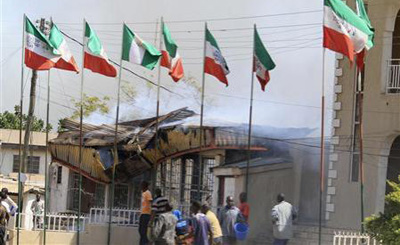Augustine Sindyi, a veteran photographer for the state-owned weekly Standard newspaper in Plateau State, was walking home from work on Christmas Eve when a nearby bomb explosion killed him instantly. Sindyi resided in a busy Nigerian neighborhood near the local government offices in the center of Jos. The assailants targeted an area that would receive immeasurable damage where Sindyi happened to live, state radio reporter Murtala Sani, told me.
The 43-year-old photographer had worked for the Standard for more than 10 years, Katdapba Gobum, chairman of the local journalist union and editor of the Standard’s sister paper, the Sunday Standard, said. “Sindyi was always ahead of the pack when it came to delivering on assignments,” Gobum said. “He knew that there were few professional photographers where he came from and so he leapt at the chance and made his mark. He will definitely be missed.”
Sindyi was the third journalist to die in deadly civil conflict in the city this year. He is survived by his wife and three children. Since December 24, about 80 people have died from the three bomb blasts in Jos and the subsequent reprisals, according to local reports.
Civil strife has afflicted Nigeria’s troubled central belt, which straddles a north that is predominantly Hausa-Fulani and Muslim and a south that is overwhelmingly Yoruba and Igbo Christian. Violence has flared for nearly a decade, with deadly riots in 2001, 2008, and 2010–with journalists caught in the middle.
In April, Muslim youths angered by the discovery of a Muslim murder victim killed Nathan Dabak and Sunday Gyang Bwede, journalists for the Christian monthly The Light Bearer, according to local news reports. The two were traveling to an assignment when they were intercepted and stabbed, Chief Editor Gyarta Pofi told CPJ at the time. One month earlier, an angry crowd of Christians attending a mass funeral attacked radio reporter Sani, who covered the event. “He was inches from losing his life,” said Wall Street Journal reporter Will Connors, who also covered the funeral. “They wanted to kill him and throw his body in the mass grave with the others.” Sani and other journalists told CPJ at the time that the state governor’s adviser on religious matters, Pastor Choji, demanded Sani hand over his identification card and told nearby men that the reporter was an ethnic Hausa-Fulani. Police and colleagues managed to help Sani escape to safety.
Dabak, Bwede, and Sani’s cases are indicative of the immense challenges reporters of all kinds face in Jos. “It has been going on for so long now we are used to the dangers,” Associated Press reporter Ahmed Saka told me. “Often we do our assignments with a police officer and journalists don’t do assignments where an event is predominantly represented by a different religion or ethnicity to the reporter.”
Since 2008, as tensions between communities grew, politicians, community leaders, and the public at large have viewed journalists as partisan to their cultural backgrounds, Gobum told me. “It has reached the extent where politicians or organizations will only invite certain journalists and purposefully exclude others to press conferences in an effort to control the story,” he said. While a handful of Jos journalists have taken sides, according the local union chairman, most journalists have remained objective and professional. “Despite this,” he added, “suspicions among the public toward journalists are very deep.”
Although the conflict has ethnic and religious dimensions, local journalists told me that political and economic issues are the main driving forces behind the discord. Many local journalists speculate that there are political influences fueling the conflict. “There are a lot of accusations and counter-accusations; the governor of Plateau State is even accusing members of the government,” Sani told me. Nigerian Muslim and Christian leaders held a press conference recently accusing politicians of fueling the crisis. Until the Jos community can resolve their differences, however, local journalists such as Sindyi will remain in the firing line, directly or indirectly.
